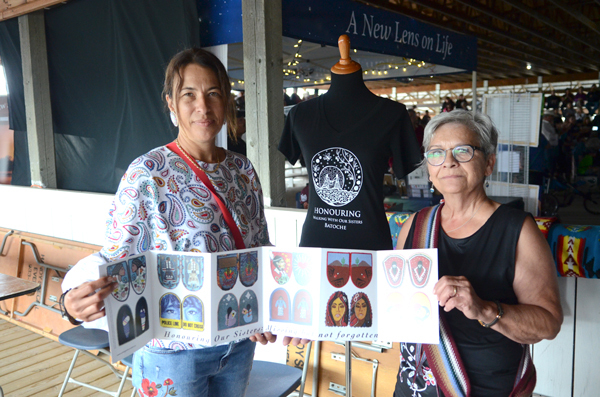
A touring art installation that has brought attention to the plight of missing and murdered Indigenous women and girls is set to make the final stop on its cross country journey in Batoche this August.
Walking with our Sisters is a collection of more than 2,000 moccasin vamps, or moccasin tops, created and donated by hundreds to draw attention to the 1,181 plus Indigenous women and girls who have been reported missing or have been murdered in the last 30 years.
“Many vanished without a trace with inadequate enquiry into their disappearance or murders paid by the media, the general public, politicians and even law enforcement. This is a travesty of justice,” the Walking With Our Sisters website reads.
“The large collaborative art piece will be made available to the public through selected galleries and locations. The work exists as a floor installation made up of beaded vamps arranged in a winding path formation on fabric and includes cedar boughs. Viewers remove their shoes to walk on a path of cloth alongside the vamps.”
Each pair of vamps represents one missing or murdered Indigenous woman. The unfinished moccasins representing their unfinished lives.
The installation also includes 108 pairs of children’s vamps dedicated to those who never returned home from residential schools.
Once the final installation is complete, the vamps will either be returned to the original artists or disposed of in a traditional way, offered to the sacred fire by the elders.
“Together the installation represents all these women; paying respect to their lives and existence on this earth. They are not forgotten,” the website reads.
“They are sisters, mothers, aunties, daughters, cousins, grandmothers, wives and partners. They have been cared for, they have been loved, they are missing and they are not forgotten.”
The installation was the brainchild of Métis artist Christi Belcourt. She put out a call on Facebook in 2012 and got hundreds of responses. The installation began touring in Edmonton in October 2013. It stopped in Regina in November and December 2013, Saskatoon the following year and North Battleford in 2016.
The Batoche installation will also be its last.
From August 15 -18, the installation will be available for people to visit between 11 a.m. and 7 p.m. at the East Village of Batoche National Historic Site. Counselling and wellness supports will also be available, as will children’s and cultural activities. It is free to attend.
“It is so much more than an art installation,” says a statement from the River Women Collective, who are hosting the Batoche installation.
“It is ceremony and it creates a space so that the community can come together for the act of honouring and remembering.”
Two weekends ago during Back to Batoche, the River Women Collective were presenting, spreading the word about the installation.
Cindy Gaudet, who was helping promote the project on July 20, said the impact of the project goes far beyond the installation itself.
“One of the things that every river collective has done is create community conversations,” she said.
”It’s brought people together to have conversations around these issues and making sure these women are known — it will never be forgotten that they are real woman with real lives.”
Gaudet said there has been an increase in awareness over the last decade, and that the installations have helped with those community conversations, one of which as held at the Prince Albert Indian Métis Friendship Centre.
In addition to the exhibit itself, tents will be set up at the Back to Batoche Grounds for visiting, for elders, for counselling and for wellness. Organizers are looking for volunteers who can help between August 10 and 24 to help set up and take down the event.
“What’s important is that people come and visit and see the space, and truly walk with the women,” Gaudet said.
“Everyone is welcome.”

